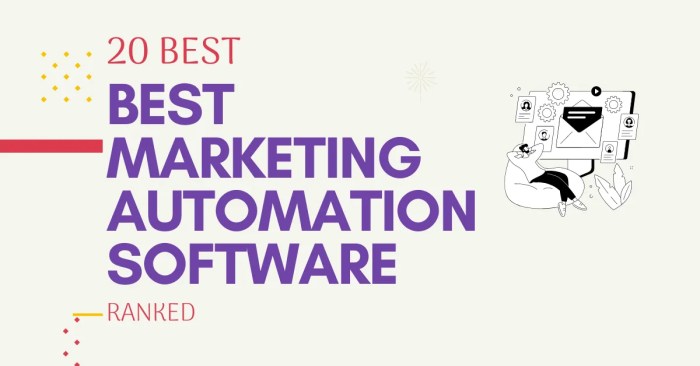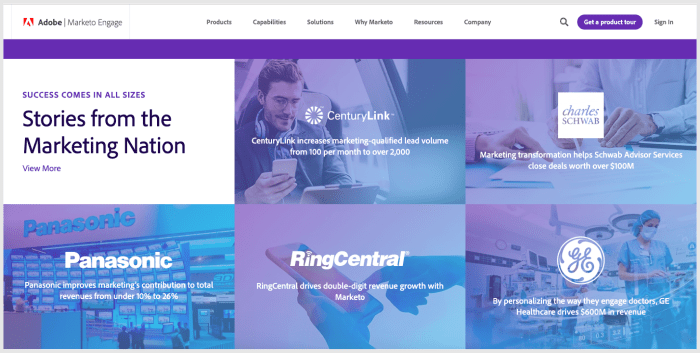Effective marketing automation software for lead generation – In today’s competitive business landscape, lead generation is paramount. Efficiently nurturing leads and converting them into paying customers requires a strategic approach. Marketing automation software emerges as a powerful tool to streamline this process, significantly improving efficiency and ROI. This comprehensive guide delves into the intricacies of choosing and implementing effective marketing automation software for robust lead generation.
Understanding the Role of Marketing Automation in Lead Generation
Marketing automation software automates repetitive marketing tasks, allowing marketers to focus on strategic initiatives. This automation encompasses various stages of the customer journey, from initial contact to final conversion. By automating tasks like email marketing, social media posting, and lead scoring, businesses can cultivate a more personalized and effective lead nurturing strategy. This leads to improved lead quality, increased conversion rates, and ultimately, higher revenue.
Key Benefits of Marketing Automation for Lead Generation:, Effective marketing automation software for lead generation
- Improved Lead Nurturing: Personalized email sequences and targeted content delivery nurture leads at each stage of the sales funnel.
- Increased Efficiency: Automating repetitive tasks frees up marketers’ time for strategic planning and creative endeavors.
- Enhanced Lead Scoring: Automated lead scoring helps prioritize high-potential leads, ensuring efficient allocation of resources.
- Better Data Analytics: Detailed reporting and analytics provide valuable insights into campaign performance and lead behavior.
- Improved Customer Segmentation: Marketing automation enables precise segmentation of audiences based on demographics, behavior, and engagement.
- Cost-Effectiveness: While there’s an initial investment, automation ultimately reduces labor costs and improves ROI.
Choosing the Right Marketing Automation Software: Key Considerations
Selecting the right marketing automation software requires careful consideration of several factors. Your choice should align with your business size, budget, marketing goals, and technical capabilities. Here’s a breakdown of crucial factors:
1. Scalability and Flexibility
Ensure the software can adapt to your business’s growth. Consider features like user management, campaign scalability, and integration capabilities with other tools.

Source: onlineearninginsider.com
2. Ease of Use and User Interface
A user-friendly interface is crucial for efficient adoption and usage across your marketing team. Look for intuitive navigation and clear instructions.
3. Integration Capabilities
Seamless integration with your CRM (Customer Relationship Management) system, email marketing platforms, and other marketing tools is essential for a unified marketing strategy. Check for API access and pre-built integrations.
4. Lead Scoring and Segmentation Features
Effective lead scoring and segmentation capabilities are critical for prioritizing high-potential leads and personalizing your marketing efforts. Look for sophisticated scoring models and flexible segmentation options.
5. Reporting and Analytics
Robust reporting and analytics dashboards provide insights into campaign performance, lead behavior, and ROI. Look for customizable reports and data visualization tools.
6. Pricing and Support
Evaluate pricing models (subscription-based, tiered pricing, etc.) and ensure the vendor offers adequate customer support, including documentation, training, and responsive technical assistance. Consider free trials or demos before committing.
Top Marketing Automation Software Options for Lead Generation
The market offers a wide array of marketing automation software. Here are some leading contenders, each with its strengths and weaknesses:
- HubSpot: A comprehensive platform offering a wide range of features, including CRM, email marketing, and social media management. Excellent for businesses of all sizes. HubSpot Website
- Marketo: A powerful platform ideal for larger enterprises with complex marketing needs. Offers advanced features like predictive analytics and account-based marketing. Marketo Website
- Pardot (Salesforce): A robust platform tightly integrated with Salesforce CRM, making it ideal for sales-focused marketing teams. Excellent for lead nurturing and scoring. Pardot Website
- ActiveCampaign: A user-friendly platform with a strong focus on email marketing and automation. Offers a wide range of features at a competitive price. ActiveCampaign Website
- SharpSpring: A mid-market solution offering a good balance of features and affordability. Suitable for businesses seeking a scalable and cost-effective solution. SharpSpring Website
Implementing Marketing Automation for Optimal Lead Generation
Successful implementation requires a strategic approach. Here’s a step-by-step guide:
1. Define Your Goals and Objectives
Clearly define your lead generation goals, target audience, and key performance indicators (KPIs).
2. Choose the Right Software
Carefully evaluate your needs and select the software that best aligns with your budget, resources, and goals.
3. Integrate with Existing Systems
Ensure seamless integration with your CRM, email marketing platform, and other relevant tools.
4. Develop Your Marketing Automation Strategy
Create workflows, email sequences, and lead nurturing campaigns tailored to your target audience.
5. Implement and Test

Source: surveysparrow.com
Launch your campaigns, monitor performance, and make adjustments based on data-driven insights.
6. Analyze and Optimize
Continuously analyze campaign performance, refine your strategies, and optimize your processes for better results.
Frequently Asked Questions (FAQ)
- Q: What is the cost of marketing automation software? A: Costs vary widely depending on the vendor, features, and number of users. Expect a range from free plans with limited features to thousands of dollars per month for enterprise-level solutions.
- Q: How long does it take to implement marketing automation software? A: Implementation time varies depending on the complexity of your setup and the chosen software. It can range from a few weeks to several months.
- Q: What are the key metrics to track in marketing automation? A: Key metrics include lead generation rate, conversion rate, email open and click-through rates, lead nurturing effectiveness, and ROI.
- Q: Can small businesses benefit from marketing automation? A: Absolutely! Even small businesses can benefit from automating repetitive tasks and improving lead nurturing efficiency. Many vendors offer affordable plans suitable for small businesses.
- Q: What are the potential challenges of implementing marketing automation? A: Potential challenges include integration complexities, data management issues, the need for skilled personnel, and the initial investment cost.
Conclusion: Effective Marketing Automation Software For Lead Generation
Marketing automation software is a powerful tool for enhancing lead generation efforts. By carefully selecting the right software, implementing a robust strategy, and continuously monitoring performance, businesses can significantly improve lead nurturing, conversion rates, and overall ROI. Embrace the power of automation to drive growth and achieve your marketing goals.
Call to Action (CTA)
Ready to transform your lead generation strategy? Explore the leading marketing automation platforms mentioned above and choose the one that best suits your needs. Start automating today and experience the benefits of increased efficiency and improved ROI!
Popular Questions
What is the average cost of marketing automation software?
Pricing varies widely depending on features, scalability, and vendor. Expect a range from free options with limited capabilities to enterprise-level solutions costing thousands of dollars per month.
How long does it take to see results from marketing automation?
Results depend on factors like implementation, data quality, and campaign strategy. While some improvements might be seen quickly, significant ROI often takes several months of consistent effort and optimization.
What are the key metrics to track with marketing automation?
Key metrics include lead generation rate, conversion rates, customer lifetime value (CLTV), email open and click-through rates, and marketing qualified leads (MQLs).
Can marketing automation software integrate with my CRM?
Most reputable marketing automation platforms offer seamless integrations with popular CRM systems like Salesforce, HubSpot, and others. Check for compatibility before selecting a platform.
